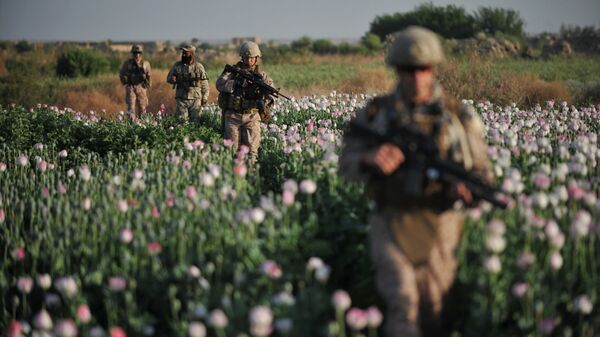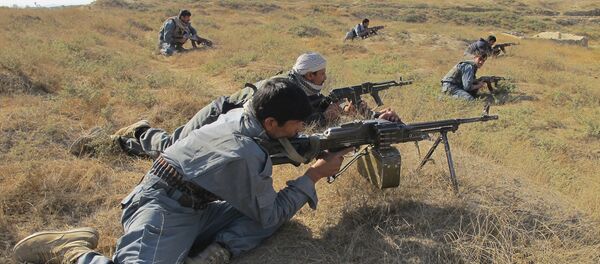According to the UN report, compiled in coordination with the Afghan Ministry of Counter Narcotics, total opium poppy production amounted to 4,800 metric tons in 2016, with rising production triggered in part by a 91% decrease in eradication efforts, due to the poor security situation on the ground and a lack of specialized funding and logistics.
Following the US-UK and NATO invasion in 2001, Afghanistan has grown to become the source of over 90% of the world's heroin.
Commenting on the worrying report, Afghan counter-narcotics researcher Najibullah Noorzai told Radio Sputnik that there are several reasons for the spike in opium production.
Among them, he noted, was a dramatic drop in international assistance in this area, especially from the UK, which "in the past had been the leading donor supporting counter-narcotics."
Moreover, the analyst explained that with the Taliban taking control of much of the country, poppy cultivation has been used to fill the insurgent group's coffers.
"There is a connection between insecurity, and the lack of government; obviously, the Taliban is taking the fortune of being in most of those provinces, and that's the source of their income for their insurgency." Ultimately, Noorzai noted that "the government needs to move ahead, and the international community will have to back it," [because] if things stay the way they are, we will have more cultivation – more production next year and in the following year."
The expert suggested that he was not totally shocked by the cultivation statistics, with production estimated to have been even higher in 2014; a drought is among the factors contributing to last year's relative decline. In any case, he noted, this year's figures are a setback, particularly given the "alarming" decline in eradication efforts.
Overall, Noorzai suggested that Kabul is simply overwhelmed by the ongoing insurgency. "Obviously, seeing the rise of the insurgency in most provinces –in the north, south, and even in the western provinces, the government in engaged in fighting an insurgency; this could mean that they do not presently have it as a priority to fight opium cultivation…There is a lack of resources, and a lack of tools to fight" cultivation.
The analyst stressed that "if opium cultivation is to be fought diligently, there needs to be more resources, dedicated forces for that, and good coordination among the security forces – law enforcement, intelligence, and other organizations; there needs to be a coordinated strategy to tackle the rise in opium cultivation." As for Western countries, they must make an effort to fill the void left by the UK in sponsoring anti-narcotics efforts, according to Noorzai.
Earlier this month, Russian President Vladimir Putin told Sputnik that "decisive actions" would be required to help the country deal with the threats of terrorism, extremism and the production and trafficking of illicit drugs. The president stressed that Russia and India in particular share a need to support national reconciliation, and are interested in deepening multilateral cooperation to support Afghanistan in solving issues related to national security, counter-narcotics capacity, and social and economic development.




